Courses
Course Philosophy
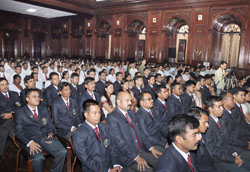 An important purpose of this training course is to give the OT the tools that he or she will need to succeed in the forestry career. Certainly, a broad based understanding is important. However, there are also certain skills which transcend any particular discipline. These include the ability to learn independently, the ability to think critically and explain your understanding with clarity, and an ability to work constructively with others. The lecture formats have the potential to deliver content, which is a major goal of many courses. However, sitting in a lecture seat does not guarantee learning, nor does it develop the skills mentioned above. Therefore, all lectures are designed with active training-centered approach in mind. The OTs are expected to analyze relevant and real life problems in light of what are learnt from lectures.
An important purpose of this training course is to give the OT the tools that he or she will need to succeed in the forestry career. Certainly, a broad based understanding is important. However, there are also certain skills which transcend any particular discipline. These include the ability to learn independently, the ability to think critically and explain your understanding with clarity, and an ability to work constructively with others. The lecture formats have the potential to deliver content, which is a major goal of many courses. However, sitting in a lecture seat does not guarantee learning, nor does it develop the skills mentioned above. Therefore, all lectures are designed with active training-centered approach in mind. The OTs are expected to analyze relevant and real life problems in light of what are learnt from lectures.
The training course for the SFS course is designed to address following requirements:
Keeping in view of the above, the following aspects are stressed during the training
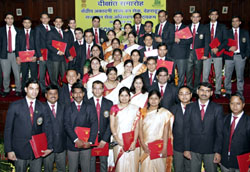 Giving him a higher level of physical fitness to handle the rigours of the above course objectives, training at the college extends for two years, which include four months ‘Filed Training’ in their respective states. Comprehensive exposure to all the subjects that are directly or indirectly related to forestry are given. Efforts are made to acquaint the trainees with the science and art of forestry. The 2005-07 course is the first sandwich pattern of training for SFS Officers in which the syllabi have been revised to keep pace with the recent trends. The OT’s will join in first week of April every year for the first phase, which lasts for sixteen months. Then they will report to their respective states, for ‘Field Training’, which is for four months. Filed training will be directly under the supervision if this college and the concerned state forest department. Finally the trainees will come back to Dehradun for the second phase for a period of four months. During this period, the trainees will be given opportunity of sharing their experiences in the states and seek solutions to the problems encountered in the field, besides, of course covering some subjects of most practical importance.
Giving him a higher level of physical fitness to handle the rigours of the above course objectives, training at the college extends for two years, which include four months ‘Filed Training’ in their respective states. Comprehensive exposure to all the subjects that are directly or indirectly related to forestry are given. Efforts are made to acquaint the trainees with the science and art of forestry. The 2005-07 course is the first sandwich pattern of training for SFS Officers in which the syllabi have been revised to keep pace with the recent trends. The OT’s will join in first week of April every year for the first phase, which lasts for sixteen months. Then they will report to their respective states, for ‘Field Training’, which is for four months. Filed training will be directly under the supervision if this college and the concerned state forest department. Finally the trainees will come back to Dehradun for the second phase for a period of four months. During this period, the trainees will be given opportunity of sharing their experiences in the states and seek solutions to the problems encountered in the field, besides, of course covering some subjects of most practical importance.
List of Equipments for State Forest Officer Course trainees
Academic Daily Schedule
In all normal working days, the official activity starts with Physical Training (PT) class for 30 minutes and ends with games class which lasts for one hour. Between these two classes there are seven lectures in the form of theory, practical or other interactions. A standard daily routine looks as follows
| 06:00 hrs - 06:30 hrs | PT |
| 09:00 hrs - 09:45 hrs | Lecture |
| 09:45 hrs - 10:30 hrs | Lecture |
| 10:30 hrs - 11:15 hrs | Lecture |
| 11:15 hrs - 11:30 hrs | Tea Break |
| 11:30 hrs - 12:15 hrs | Lecture |
| 12:15 hrs - 13:00 hrs | Lecture |
| 13:00 hrs - 14:30 hrs | Lunch Break |
| 14:30 hrs - 16:00 hrs | Practical |
| 17:00 hrs - 18:00 hrs | Games |
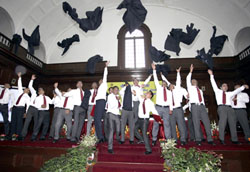 Generally the pre lunch session is devoted to theory and post lunch, for practical classes. During the winter the PT class may be postponed to 0630hrs to 0700 hrs and during summer the games class maybe postponed to1730hrs-1830hrs with the approval of the principal.
Generally the pre lunch session is devoted to theory and post lunch, for practical classes. During the winter the PT class may be postponed to 0630hrs to 0700 hrs and during summer the games class maybe postponed to1730hrs-1830hrs with the approval of the principal.
In order to keep the in-service officers abreast of the latest development in forestry, the college conducts a wide range of refresher courses of 2-3 weeks duration, leading to award of certificates.
Assessment
There are 4 categories of assessment that the trainees undergo during a course in SFS College. They are:
End Semester Exam
The course is divided into four semesters. There shall be three such semesters during the first phase and one examination in the second phase.
The maximum marks for each subject shall be as follows:
| Sl. No | Theme | Theory | Practical | Total |
|---|---|---|---|---|
| First Phase | ||||
| 1. | General Botany/Mathematics | 100 | 0 | 100 |
| 2. | Application of Modern Tools & Tech | 100 | 100 | 100 |
| 3. | Silviculture –I | 150 | 50 | 200 |
| 4. | Silviculture –II | 200 | 0 | 200 |
| 5. | Forest Resource Assessment | 150 | 50 | 200 |
| 6. | Forest Survey | 100 | 100 | 100 |
| 7. | Forest Policy and Law | 250 | 0 | 250 |
| 8. | Forest Engineering | 100 | 100 | 100 |
| 9. | Ecology and Environment Science | 200 | 0 | 200 |
| 10. | Adverse Influence on Forest | 150 | 50 | 200 |
| 11. | Forest Utilization-I | 150 | 50 | 200 |
| 12. | Forest Utilization-II | 200 | 0 | 200 |
| 13. | Forest Resource Management | 200 | 0 | 200 |
| 14. | Natural Resource Management | 150 | 100 | 250 |
| 15. | Environment Economics | 200 | 0 | 200 |
| Total | 2400 | 600 | 3000 | |
| Second Phase | ||||
| 1. | Biodiversity Cons and Management | 200 | 50 | 250 |
| 2. | JFM, Rural and Tribal Development | 100 | 0 | 100 |
| 3. | Human Resource Dev. & Management | 150 | 0 | 150 |
| 4. | Forest Accounts & Procedures | 100 | 0 | 100 |
| Total | 550 | 50 | 600 | |
At end of second phase, each OT will undergo a viva voce test before a panel of experts who shall evaluate his knowledge out of 200 marks.
Field Training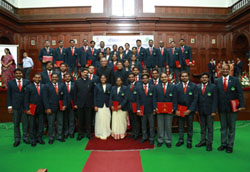
With the enforcement of the new Entrance and Training (Revised) Rules, 2004, the field training will be sandwiched between first phase (16 months) and second phase(four months) of the SFS Course. During these four months of ‘Field Training’ the ’Officer Trainees’ shall be attached to the following functionaries of the state for adequate exposure in matters of governance, general administration an forestry activities in this state
Forest Range Officers (Five Weeks)
Divisional Forest Officer (Five Weeks)
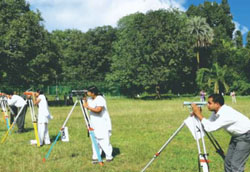
Forest Corporation (Two Weeks)
Revenue Authorities (One Weeks)
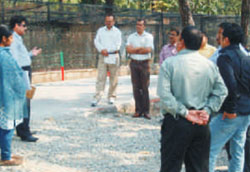
Law Enforcement Authorities in the District and Tehsil level (one Weeks)
Public Prosecutor, Government Counsels (Two Weeks)
The Divisional Forest Officer, with whom the ‘Officer Trainee’ is attached, shall be responsible for successful completion of ‘Field Training’. A total of 200 marks shall be earmarked for ‘Field Training’ of which the Divisional Forest Officer shall assess the OT for 100 marks. The college, on the basis of monitoring and feed back, shall assess for the remaining 100 marks.
Tour Exams and field exercises
There shall be five study tours during the whole training. After every tour, a tour exam quiz and symposium will be conducted besides submission of botanical collection and tour journal by the OTs. The distribution of marks for each tour is as follows:
Total marks for 5 tours 1000
| Tour Exercise Max Marks | Field Exercise Phase Max Marks |
|---|---|
| Tour Exam - 80 marks | Road Alignment I 50 |
| Tour Quiz - 20 marks | Engineering I 50 |
| Symposium - 20 marks | Working Plan II 250 |
| Botanical Collection - 30 marks | Ecological Census Techniques II 50 |
| Tour Journal -50 marks | Total : 400 |
| Total : 200 marks | |
Internal Assessment
Based on overall conduct, each OT shall be awarded conduct marks our of a maximum of 250 marks at the end of the course through internal assessment. The criteria shall be:
Training in allied activities
Training is also imparted in some allied fields as listed below. These trainings do not contribute towards the preparation of final merit list. However, behaviour and seriousness that the trainee shows during such trainings is closely monitored. This, of course, influences the award of final conduct marks
Abstract of Marks for the course
| S.No | Item | First Phase | Second Phase | Total Phase |
|---|---|---|---|---|
| 1. | Written Examination | 3000 | 600 | 3600 |
| 2. | Tour Exam | 800 | 200 | 1000 |
| 3. | Field Exercise | 100 | 300 | 400 |
| 4. | Field Training | - | 200 | 200 |
| 5. | Viva Voce | - | 200 | 200 |
| 6. | Conduct Marks | - | 250 | 250 |
| Total | 3900 | 1750 | 5650 | |










